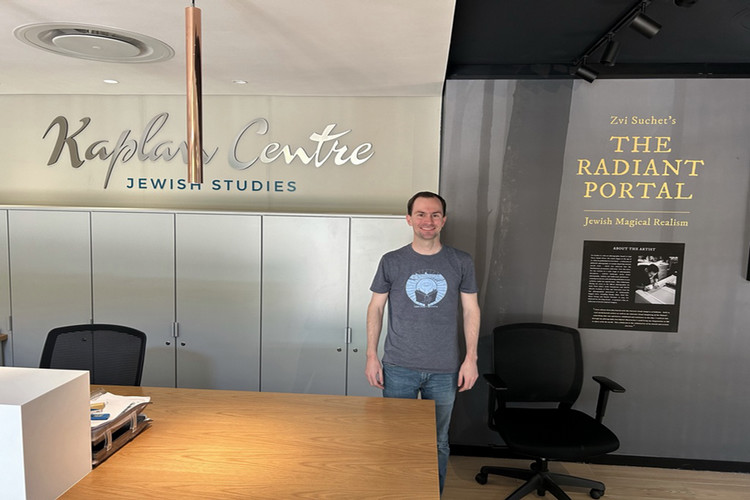Using South African Archives to Study Post–World War Two Antisemitism and White Supremacist Networks

On April 1, 2022, a document in the American Jewish Archives in Cincinnati, Ohio, changed how I understood US civil rights opponents’ international contexts and connections. For weeks, I had been researching anti-Jewish bombings done by segregationists in the American South during the 1950s and 1960s, and I decided to spend a few days with records from the World Jewish Congress, a global network of Jewish organizations. That afternoon, I opened a folder unassumingly titled “United States, anti-Semitism, reports, 1958, 1960, 1963.”
In that folder was a short report that discussed several of the 1958 anti-Jewish bombings that are central to my dissertation’s second chapter. Unlike other reports on US antisemitism, this one placed those bombings in international contexts, noting that self-described Ku Klux Klan (KKK) members had carried out simultaneous anti-Jewish bombings in Santiago, Chile. The report also warned of antisemitic KKK members in Britain and Uruguay and described international streams of anti-Jewish literature.
I decided to check corroborating files in the World Jewish Congress records, where I found information about links between US white supremacists and antisemitic groups overseas. Two folders documented far-right activity in South Africa, where another self-described KKK leader encouraged antisemitic violence. I wondered why non-US white supremacists would join a US-based Klan organization and advocate anti-Jewish violence specifically.
I am grateful to the Tam Institute for Jewish Studies for providing a grant to support my archival research connections between antisemitic networks in South Africa and civil rights opponents in the US South. With support from the Tam Institute and two additional grant bodies, I spent three weeks researching in two South African archives: the Kaplan Centre for Jewish Studies and the Archive for Contemporary Affairs. Records from those archives helped me understand links between some US civil rights opponents and far-right groups overseas.
I conducted my first week of research at the Kaplan Centre, located at the University of Cape Town. One of two major Jewish archives in South Africa, the Kaplan Centre holds the records of the Cape Council of the South African Jewish Board of Deputies (SAJBD), and umbrella body for Jewish congregations and organizations. The SAJBD records best document Cape Town’s antisemitic groups, including ones with connections to British and US white supremacists.
With help from the archivist Katie Garrun, I combed through SAJBD records in search of information about mid-century South Africa’s far-right groups and their overseas connections. The SAJBD monitored propagandists, who over the 1950s took increased interest in US white supremacists who explicitly or implicitly argued that supposed Jewish networks directed the US civil rights movement, Black liberation and decolonization efforts in Africa, and world communism. Some far-right South Africans published lengthy antisemitic quotes from prominent US segregationists, such as Mississippi Congressman Thomas Abernathy. The SAJBD records illuminated why far-right South Africans looked more to some US civil rights opponents than to others. As in the United States, blatant antisemitism became increasingly unacceptable in South Africa over the 1950s. For far-right South Africans, US extremists who also subscribed to anti-Jewish conspiracy theories were increasingly rare allies. Moreover, their shared erroneous belief— that an international Jewish network directed Black activists in the United States and South Africa—led far-right actors in both countries to view their fights for white supremacy as tightly linked. Antisemitism largely explained why far-right South Africans seemed more interested in the US civil rights movement and its segregationist opposition than those closer to the political mainstream.
As KKK members increasingly perpetrated violence in the civil rights South, some white South Africans sought to join US-based KKK organizations. To study South African Klan members, I spent two weeks in the Archive for Contemporary Affairs in Bloemfontein. Following guidance from the South African historian Milton Shain and the archivist Lwazi Mestile, I focused on the papers of Ray Rudman, South Africa’s self-described Klan leader during the 1950s and 1960s. Rudman’s papers contained letters and recruitment materials about joining a Klan organization based in Waco, Texas.
I expected white South African Klan recruits to describe their opposition to the anti-apartheid movement, a liberation movement that in many ways paralleled the US civil rights movement, as their main motive for joining. Some did. But to my surprise, antisemitic beliefs that far-right South Africans shared with US-based Klan leaders seemed to them an equally important connection, if not a more important one. They described entering the Klan as joining US white supremacists in fighting the supposed international Jewish conspiracy that they falsely believed controlled world communism, the civil rights movement, and the anti-apartheid movement.
Records from Cape Town and Bloemfontein have enriched my work by showing how antisemitism was an ideological factor that increased far-right South Africans’ interested in US civil rights opponents. I am grateful to the Tam Institute for supporting this research, which has greatly strengthened my second chapter’s analysis of the international dimensions and influence of the civil rights movement’s violent opposition.
Published 4/4/24